Russian and Malorussian (Eastern Ukrainian) mass consciousness underwent largely similar transformations between the mid-80s and mid-00s. United by an overwhelming Americanophilia and capitalist optimism at first, attempts at discovering own unique paths started to prevail the further away we went from 1991. In Russia, many link the deepening of these processes to the failure of NATO integration, in which the West played a significant part. In Ukraine, de-Russification and de-Sovietization processes produced a reaction, outcomes of which we have not fully seen yet. In 1993, when Michael Jackson’s popularity was still at its peak, several men founded the National Bolshevik Party. Perceived as an experimental cultural project at best or a joke at worst, it influenced the grassroots political activists, the art scene, and eventually major decision-makers to a great extent.
Two of them were the most important. Privileged Muscovite golden boy Aleksandr Dugin, son of the major GRU colonel-general. And ethnic Ukrainian Eduard Savenko, better known under his Russified pseudonym Limonov (alluding to both lemons and informal grenade name). Who was also the son of a KGB-adjacent father, albeit of a smaller caliber. Third place is often awarded to a popular rock musician Yegor Letov, whom my text will completely and mercifully skip - I have stayed loyal to Michael Jackson and missed all the guitar-n-vodka debaucheries related to this man. Letov is often popular among Ukrainian nationalists, and popular Twitter user Pan Shamil is his fan.
Majority of information about Limonov’s childhood comes from his own memoirs and as such should be taken with a grain of salt. My uncle, musician Vladimir Belousov, knew him personally but shared little, preferring to talk about my Jewish grandfather instead. Contrary to the fairly well-done movie “It’s Russian”(Russkoe), which was filmed in Kharkiv in the peaceful times of the mid-00s and told about his teenage years sympathetically, all photographic evidence of the time suggests that Savenko was a somewhat weak boy with imperfect sight and the occasional need to wear glasses. That’s not the type that usually becomes successful hooligans. His sexual problems, depicted in the same movie, are more believable and a reasonable explanation for his lifetime obsession with extremely slutty women.
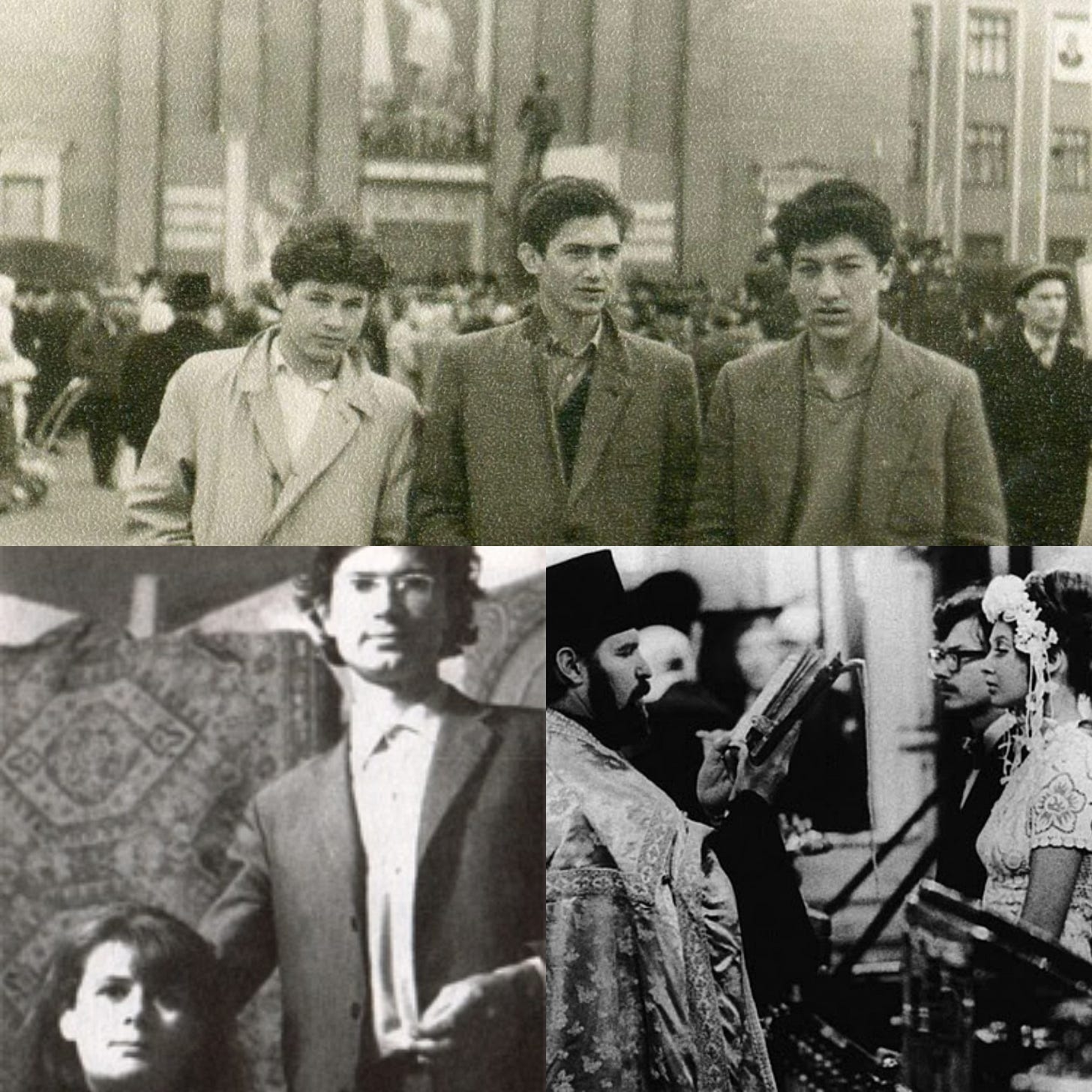
From what is known about young Limonov, he always wanted to relocate out of Kharkiv as soon as possible and preferably to Moscow. He kept berating Kharkiv’s provincialism until the very death. His first trip was mostly spent sewing paints for Moscow intelligentsia. The second attempt was more successful, and apart from managing to find clients for his poetry, he made deeper contacts with the established intelligentsia and found a model wife Elena Shchapova. The whole marriage and emigration affair was such a blatant in-your-eyes KGB operation, it is a miracle that it was never seen this way by most of his pre-2014 fans and supporters. First, Soviet fashion models in the early 70s were rarer than uranium deposits. Second, those that did exist were behaving exactly as they do now - looking for top-tier bureaucrats, not romantic poets. Third - no one was sent into exile as a punishment or as a preventive measure, especially not to the capitalist countries. Well, Solzhenitsyn was, in the very same year. Punitive psychiatry existed for such needs and that decade was a very busy time for asylums. Finally, the couple used Israeli exit visas as non-Jews in times when actual Jews weren’t able to get them, only to end up in Austria first, then America and Italy, and divorce. He entered the exciting world of New Yorkian interracial homosexuality and she married an Italian nobleman as she was always supposed to, what a love story. But at least they had a religious wedding and a nude photoshoot, both are quite non-conformist actions for 1973, revealing that bourgeois developments were already at advanced stages in Soviet security services.
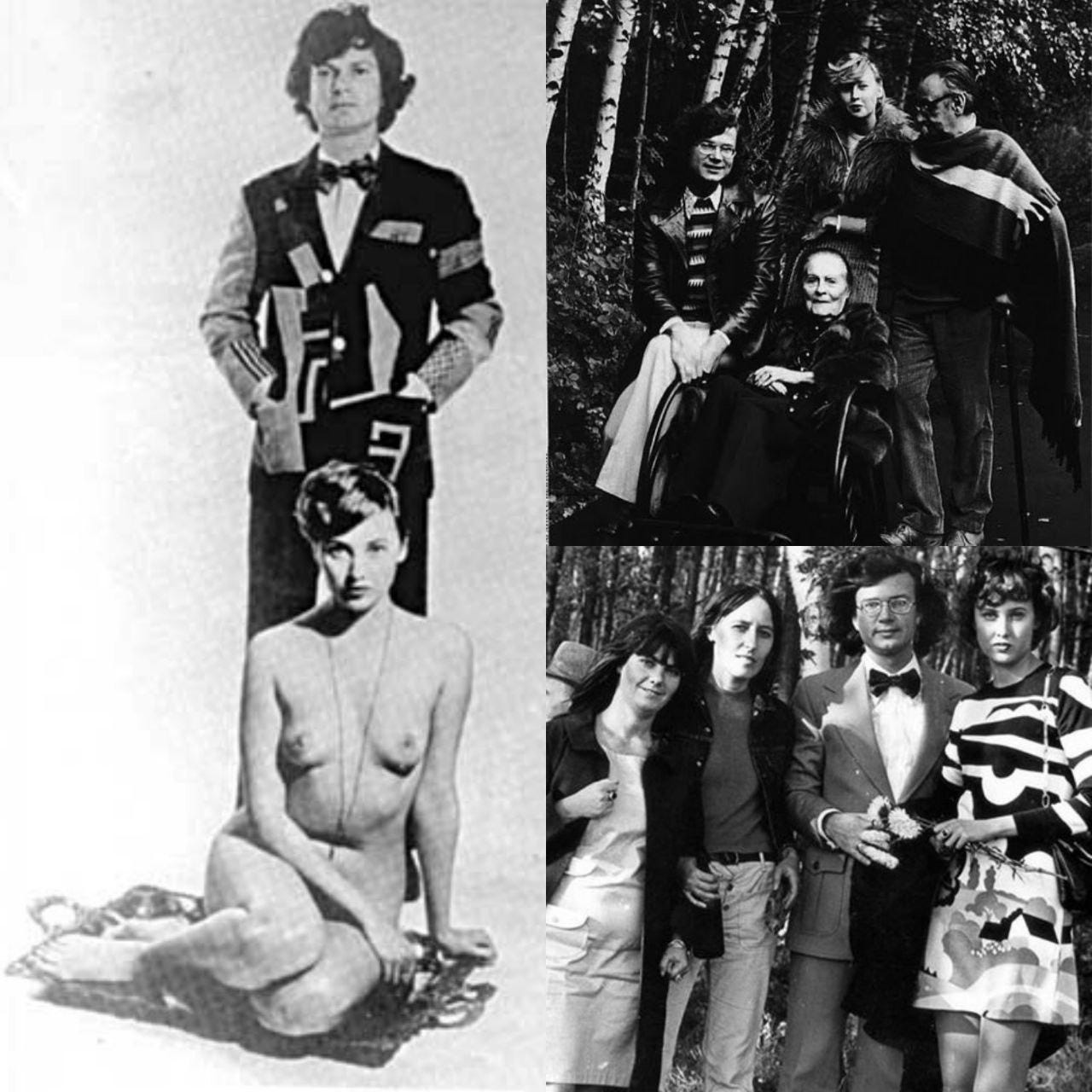
In America, Limonov started to do what all KGB-adjacent Soviet residents do once they’ve safely infiltrated - missing the Motherland, exposing the Western weaknesses, blaming the Soviet dissidents for luring them away from their beloved country. Sure, this fertile soil was already prepared for him in advance by the French existentialists, anti-Vietnam war activists, pornographers, and dying, but still alive New Left intelligentsia. While in Moscow, he showed no interest in Marxism. While in New York, he quickly joined Trotskyist groups. American publishers were still anti-Soviet enough to refuse to publish his premier narcissistic novel “It’s Me, Eddie” for several years before he apparently found some serious connections in France, where the book became a bestseller and American publishers became more open to talks. Numerous appeals of the FBI and French counter-intelligence to the French authorities were somehow dismissed and he got a French passport in 1987, after being a stateless person for 13 years and entering France on whatever documents such people have. If his task in America was to spread Sovietophilia among the New Left, then he failed miserably. Because despite being Soviet, he was still to the right of the American New Left.
It is France that will forever remain his main achievement in terms of popularity per inhabitant. Having published 17 books, some of whom remained exclusively Francophone, he became the most well-known man of Kharkiv origins in Europe. As a writer, he will soon be outshadowed by Viktor Pelevin and Vladimir Sorokin in Russia. In Ukraine - by Sergiy Zhadan. It is Pelevin who will formulate the demand for the invention of a new Russian Idea in his novel “Generation P”. As of 1990, Limonov was one of the most fresh thinkers of the crumbling socialist Empire, at least among those public persons who were able to present their thoughts to large audiences with the help of obvious or not-very-obvious benefactors. Western in his way of life and self-presentation, anti-Western in rhetorics, Ukrainian by blood, Russophilic by politics, leftist to conservative Soviet people, rightist to energetic American leftists - it’s not like this dude wanted to collect all possible contradictions, it’s just the peculiarities of international culture wars reach their crescendo somewhere around our native city.
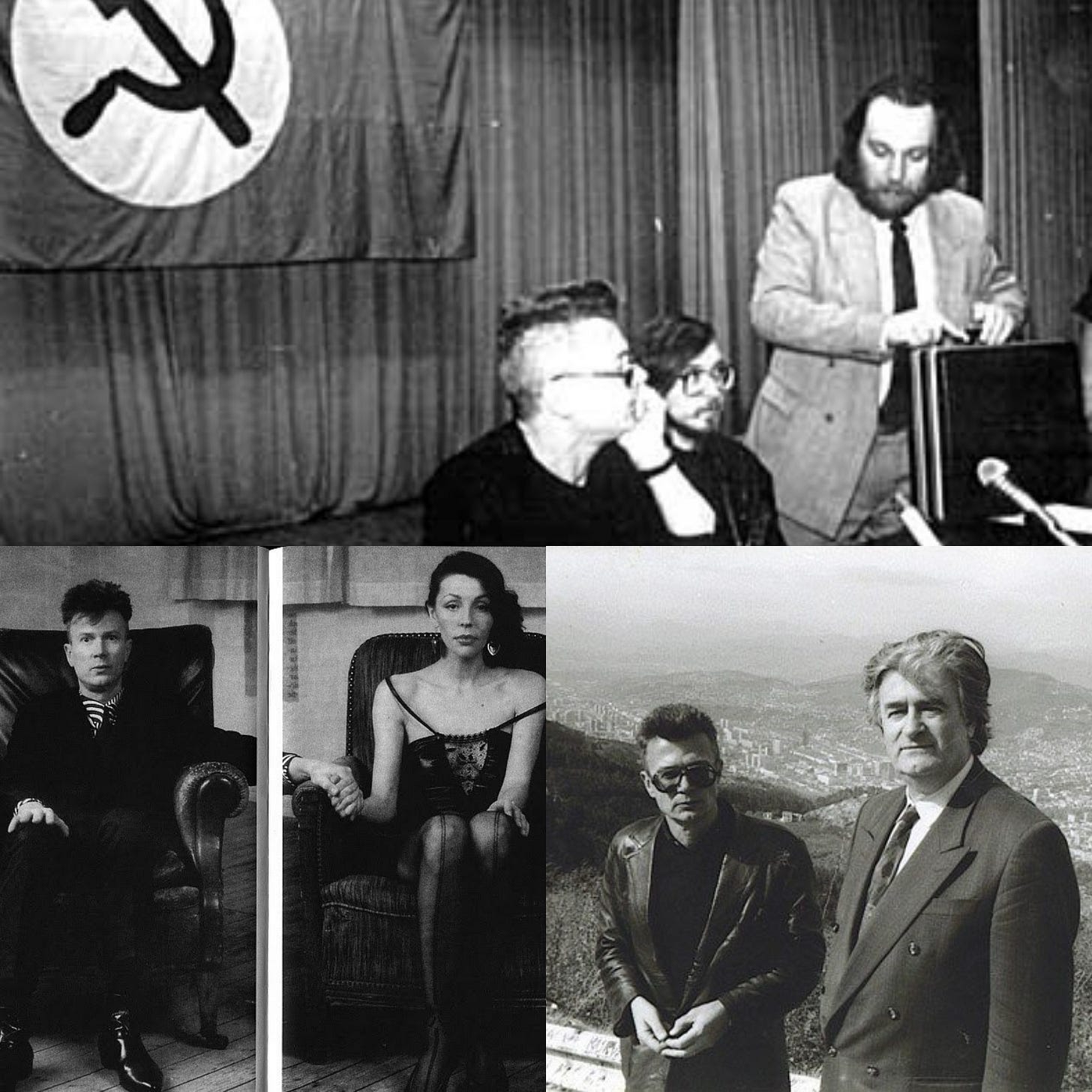
Although Aleksandr Dugin was quick enough to appear a few times on Soviet television as an anti-communist Orthodox revivalist, he entered our picture in 1993. Already an accomplished fascist, expert on Julius Evola and Rene Guenon, with a solid amount of time spent in quasi-satanist sects where he allegedly practiced so-called “solar initiation”, homosexual acts with those willing to be his apprentices. He is credited with luring Limonov into politics. Dugin was always more serious about his statements and had a more fundamental knowledge about all things a proper party leader should know - philosophy, sociology, religion, bureaucratic mechanisms, foreign relations, and culture. And yet, he always preferred to work within the bureaucracy, continuously enhancing his connections and standing with the most powerful and rich. Limonov, on the other hand, found out that party building is to his liking and suits his natural abilities of charming average art-adjacent folk. He became the party’s most efficient recruiter and, with time, developed a belief that he would do just fine as a lone leader. Unfortunately for him, his worldview always remained in 1990, he remained a liberal democrat in exotic clothing and with slight xenophobic tendencies (which were much less severe than most people on the explicitly anti-Soviet right-wing movements tended to have). Ukrainian conservative nationalist Dmytro Korchynsky recalls a talk with Limonov at the time when they had normal relations in one of his YouTube videos. He asked what National Bolshevism was supposed to achieve, and Limonov replied - honest elections in Russia. Korchynsky was greatly disappointed with this reply and I agree with his sentiment - quite a pitiful goal for such a grandiose presentation.
Only a few NBP members remembered who the f*ck Ernst Niekisch or Nikolay Ustryalov were, despite them being the formal beacons of the program.
Dugin continued to drift towards esoteric nationalism, together with his odd pal of the time - Islamist Leninist Geydar Dzhemal. I find this understanding of Lenin by Dzhemal to be the most sane among all religious fundamentalists in post-Sovietia, even though the guy only adopted such a stance in hopes of popularizing Islam among the CPRF electorate. Interestingly, he was respected by the Azov-adjacent Ukrainian right-wing feminist movement “Sriblo troyandu” up until around 2020, long after Dugin himself was denounced. Then again, Dzhemal spent his last days as a popular oppositional YouTuber, never getting that close to the Kremlin higher-ups.
Limonov eventually went his own way and fully embraced Russian liberals, becoming the muscle of Other Russia anti-Putin protests for a significant stretch of time. This made him a desirable guest among pro-Ukrainian liberals in Kharkiv before the second Maidan. Yevgen Zakharov and the Ukrainian Helsinki Human Rights Union were rushing to embrace him at the time. Even his failed plans of Imperialist raids to Kazakhstan were overlooked, which resembled the future Igor Strelkov-Girkin incursion to Sloviansk. The FSB did not stop Girkin. They stopped Limonov, who was known as a notorious color revolution agent throughout the 00s.
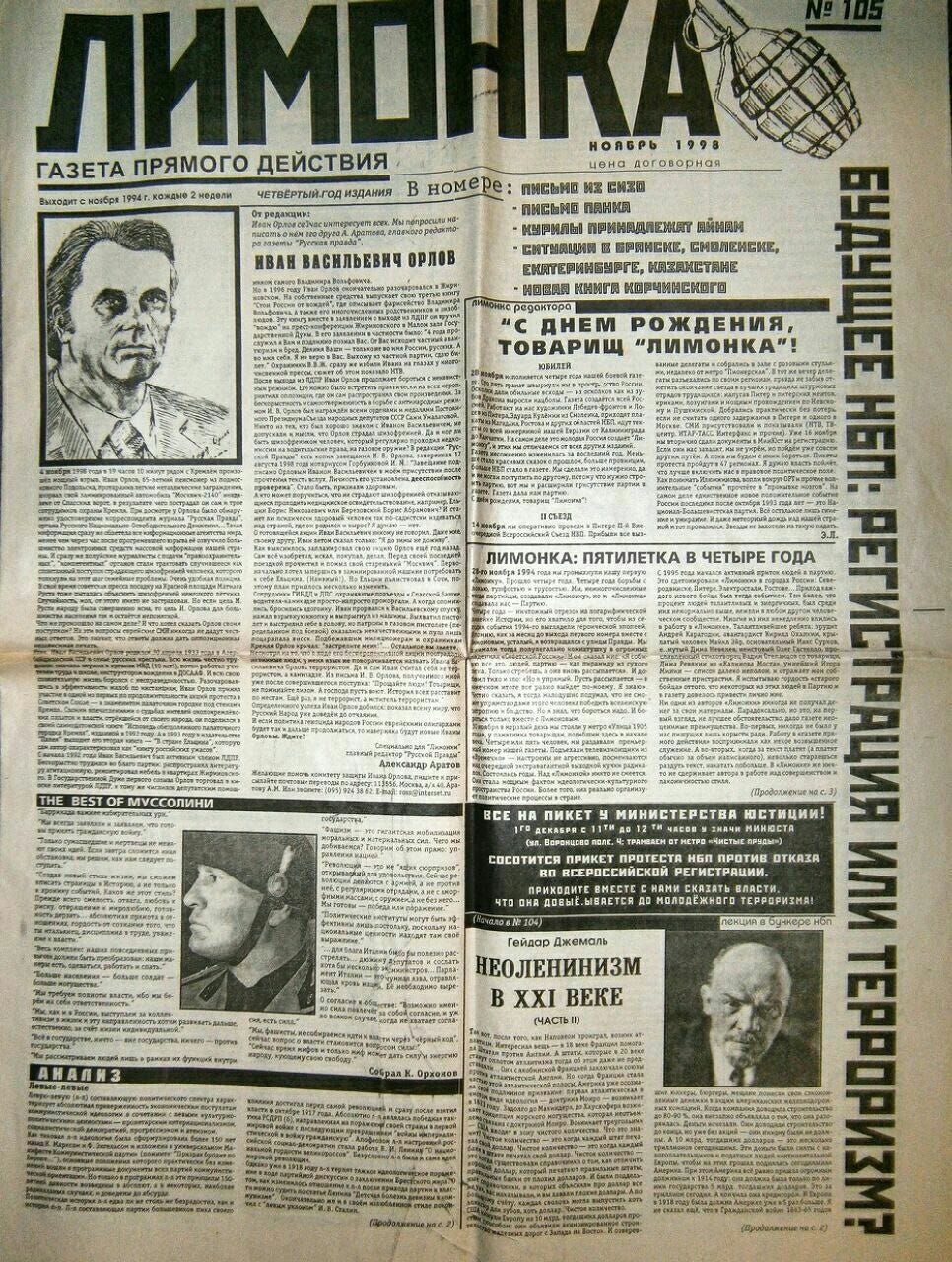
The late 00s, the time when I was starting as a political activist, were a naive and kind environment compared to what is out there now. A lot of queer folks hung around politicized spaces, but most of them were willing to work with heterosexuals in harmony and exhibited nothing resembling modern woke hysteria. At the time I was much to the left of Limonov and was greatly off-put by his toying with Nazi symbolism. I did not like nationalist elements and preferred alter-globalism. I wouldn’t go as far as a complete re-nationalization of private property, but I had plans about judicial discrimination of the strong in favor of the weak. My motto of the day - nothing is okay until janitor is able to beat up the prosecutor with impunity. We discussed all these things with Limonov online, he deemed me a radical and blocked on Vkontakte, the most popular social network of that age. Then he continued to reassure everyone how much of a non-Marxist he was, this wasn’t the 70s America after all. Eventually, he settled up with a bunch of working-class alcoholics in Kharkiv, returning most of his attention to Russia.
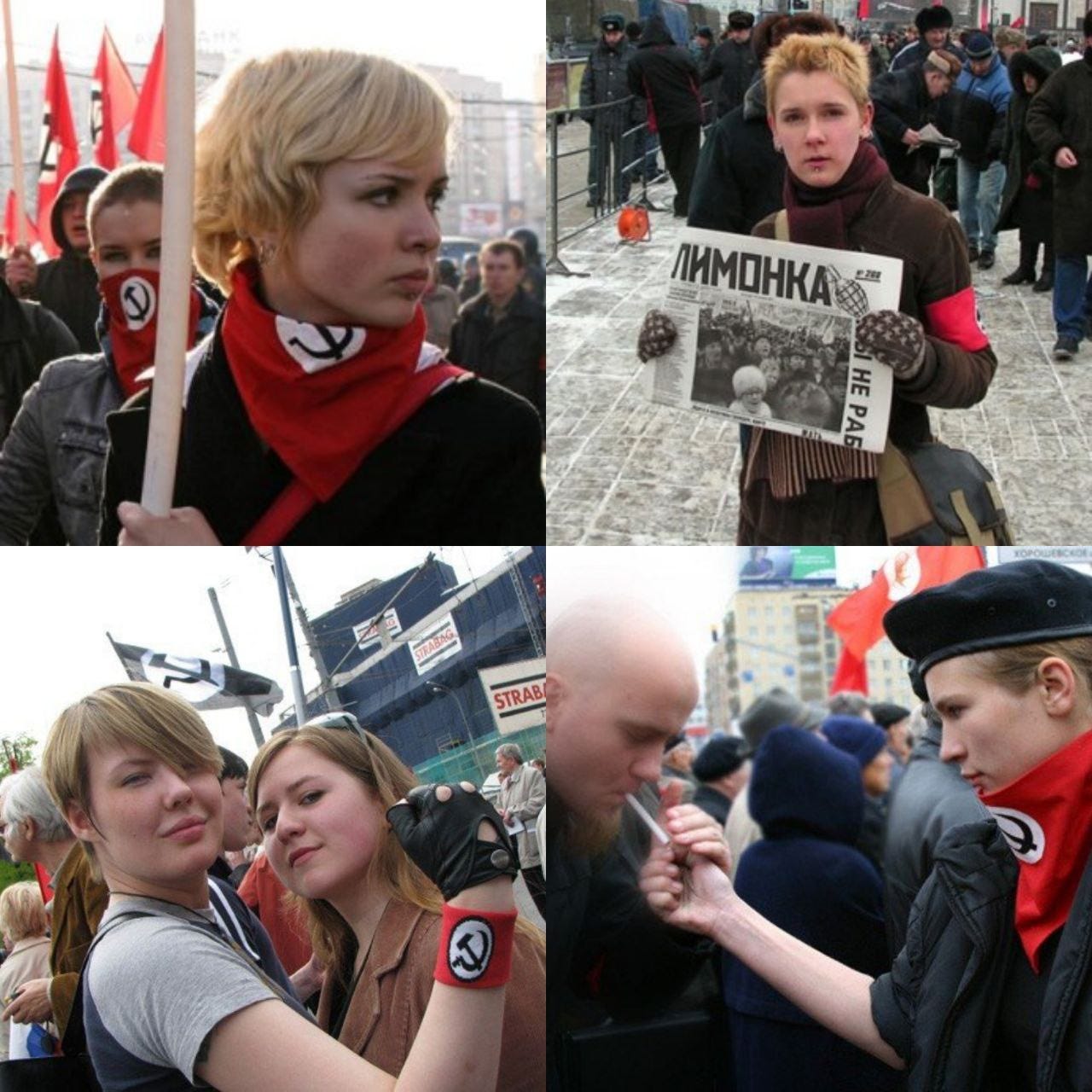
Interestingly, those folks who were chosen by Limonov to be his Kharkiv branch were always pro-, not anti-Putin. They weren’t radical separatists by any means, and I don’t remember any of them surfacing at DPR/LPR militia. They weren’t liked or respected by either the future separatists or future nationalists, and made zero impact on anything whatsoever. But I guess this is a proof that NBP leaders never really thought that Ukraine and Russia are the same. And just like the Kremlin always wanted to see center-right politics in Russia and center-left politics in Ukraine, NBP leaders thought it wise to influence grassroots protests differently.
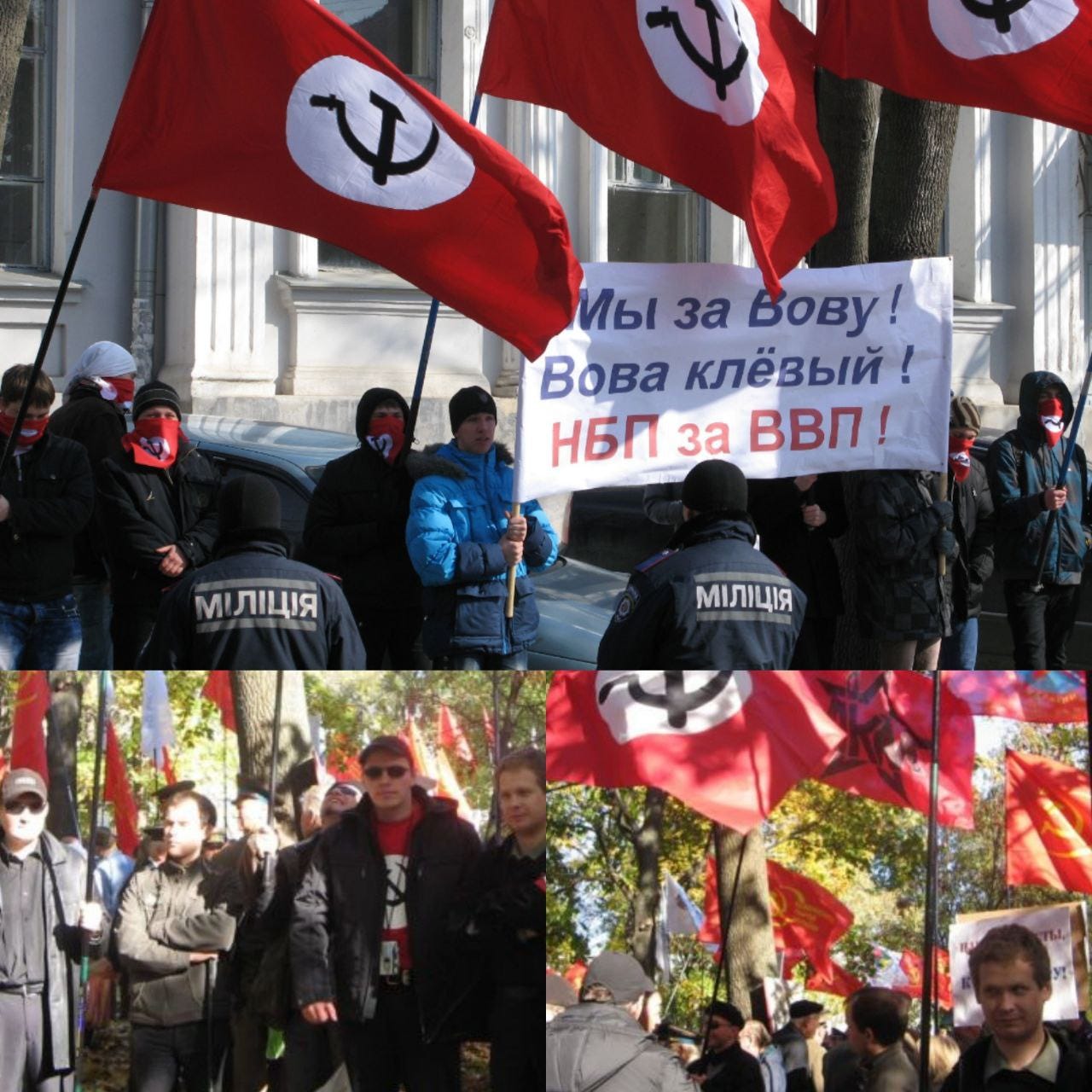
Eventually, 2014 happened and Limonov was denounced by all liberals, Russian and Ukrainian alike, for sending his men to Donetsk to support separatist militants. He tried to do the same in Kharkiv and managed to hold the flag of the “Kharkiv People’s Republic” together with Konstantin Dolgov, who was a divisive center-right person among separatists in Kharkiv and was denounced by such people from their camp as suspected Zelensky assassin Oleksiy Kornev (according to SSU official media and BBC’s 2024 article) for what they saw as excessive centrism. KhPR was declared by a socialist Anton Guryanov from the Sergey Kurginyan movement, apparently against the wishes of the Orthodox wing of anti-Maidan (pro-Z war veteran of Kharkiv origins Sergiy Yudaev called the whole declaration affair premature and influenced by people from Kharkiv’s Maidan). Guryanov was much to the left of Dolgov, on the economy especially. Limonov choosing to pick the latter before the former was in line with his post-American habit of avoiding Marxists, even in their neo-Sovietist form. Nowadays KhPR is completely forgotten by official Kremlin channels, and if “reunification” happens, it will be in Kherson-Zaporizhzhya manner, as oblast. Which spells good fortune for Orthodox political refugees, particularly Sergiy Moiseev from “Triune Rus” organization and his friend Kirill Frolov, people who are closer to Patriarch Kirill than Dugin, much less Kurginyan.
I always advise tracing reciprocity in all things political. Westerners are obsessed with the presence of Orthodox icons in Dugin’s media, but not with the absence of Dugin or his portraits in Orthodox media (Tsargrad is rhetorically pro-Orthodox oligarchal media, an important distinction). Ukrainians were obsessed with separatist themes in Limonov’s media, but not with the absence of Limonov from the statements of influential separatist militants. Public support for something or someone is important. Yet it often stands in the way of understanding the true nature of a person or collective in relation to each other.
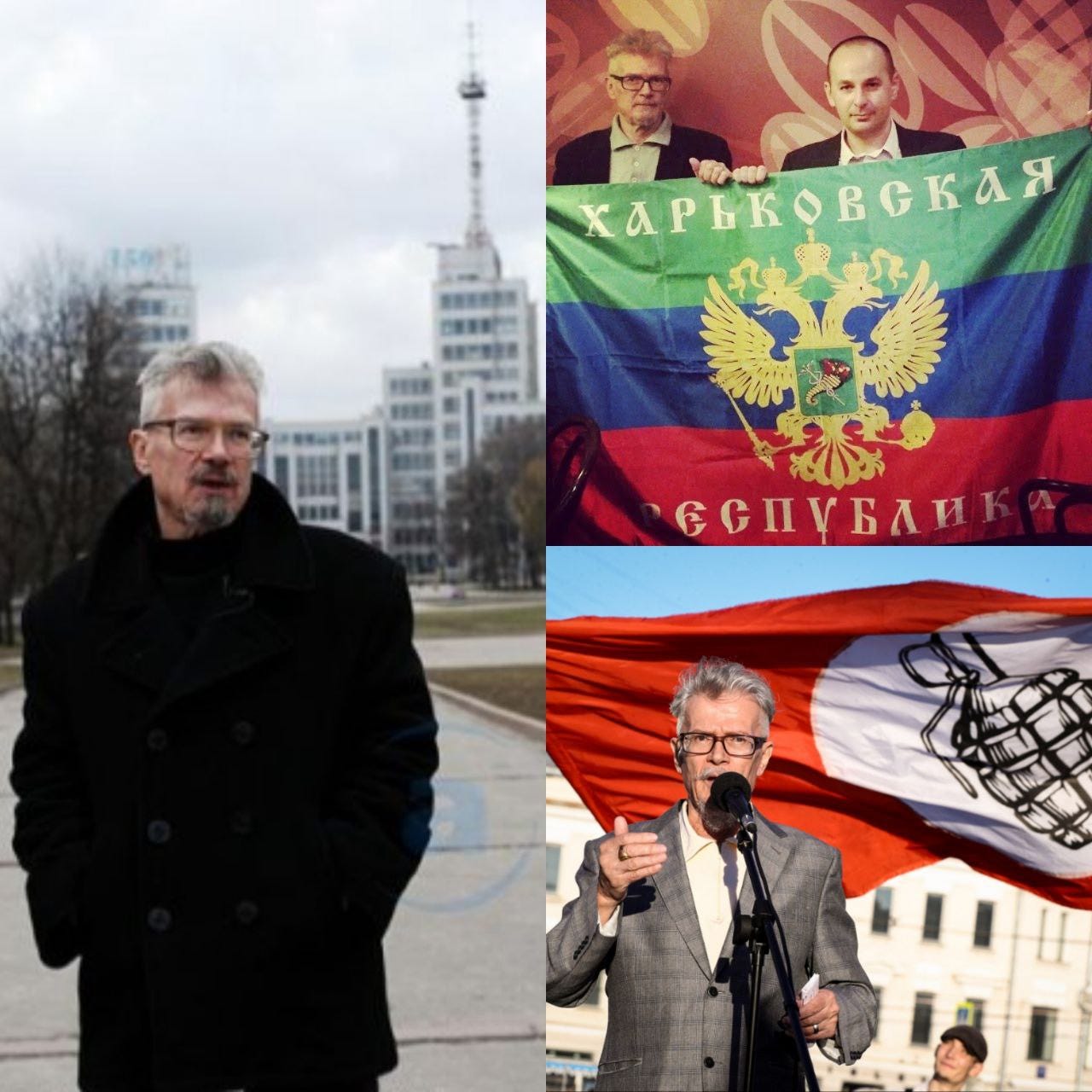
By propping up Dolgov, a failed Kushnaryov at best, Limonov chose the most moderate form for such a radical thing as pro-Russian separatism in Kharkiv. Once again, for the final time, he failed to move left with Guryanov, neo-Stalinists from Borotba, or the remnants of the Communist (in name only) Party of Ukraine.
Whatever interesting and controversial aspects Limonov did have, he discusses them with the Maker at the moment. Dugin lives on and is free to frame the NazBol legacy to his liking. Being younger than Limonov by 20 years, he never looked young even before adopting the current bearded volkhv style. In the 90s he looked like a typical Russian accountant - signs of low physical activity, moderate alcohol use, and heightened neurological self-awareness.
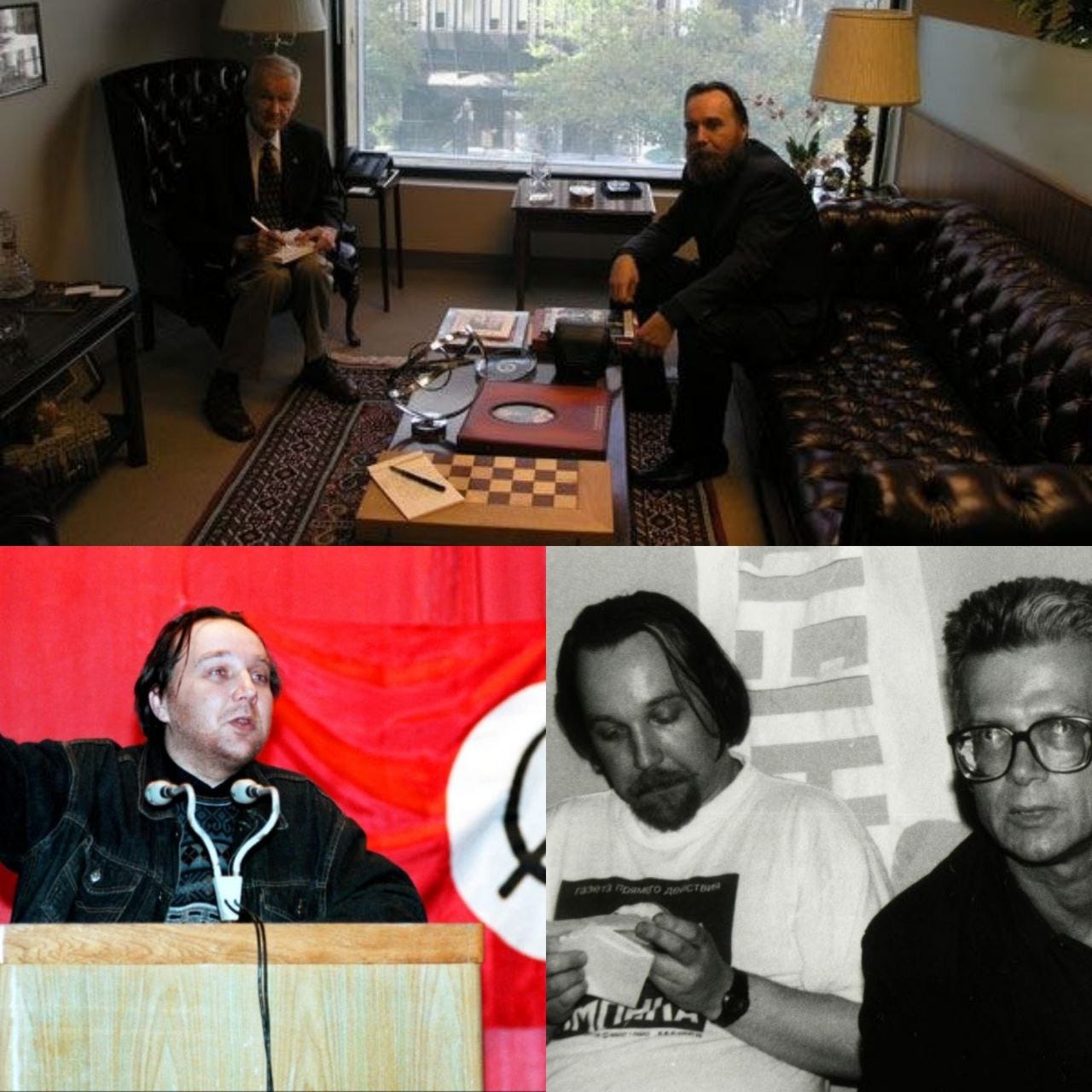
As of now, one of my most prestigious international mentions happened on the British center-right site UnHerd, in the article “How Aleksandr Dugin influences the West” by Aris Roussinos. Shortly afterward I was preventively blocked by Duginist media DD Geopolitics on Twitter, but not by Dugin himself. Apparently, both the article and my name successfully reached the people monitoring the Western attitudes toward the philosopher. A decent article in itself, but by now it is slightly outdated, misses a few important points, and makes a couple of disproven assertions. First, I think that Dugin’s influence within Putin’s regime is not at all overstated. We got the proof when his daughter’s killers were identified almost immediately, breaking with the tradition of eternal investigations related to the murders of Boris Nemtsov or Anna Politkovskaya. I am inclined to think that rumors of Dugin’s low value to Putin are spread by Russian center-right competitors to Dugin, who are interested in getting ahead of him both in the West and inside Russia. Second, as I already revealed to Roussinos in my personal correspondence, Anton Shekhovtsov is not just a “Ukrainian scholar of Radical Right intellectual thought”, but a former chair of the Crimean branch of Duginist Eurasian Youth Union, who spent whole two years at this position and was known to be a fan of Romanian fascist Corneliu Codreanu at the time. It is Andreas Umland who picked him up there and made him who he is today - a liberal who has better relations with Western European liberals than with Kievan liberals, who occasionally accuse him of being Moscow-centric. Some Russian right-wingers thought of him as a missing link in Dugin’s fourth political theory, which never denied the necessity of liberal input. More on that theory below.
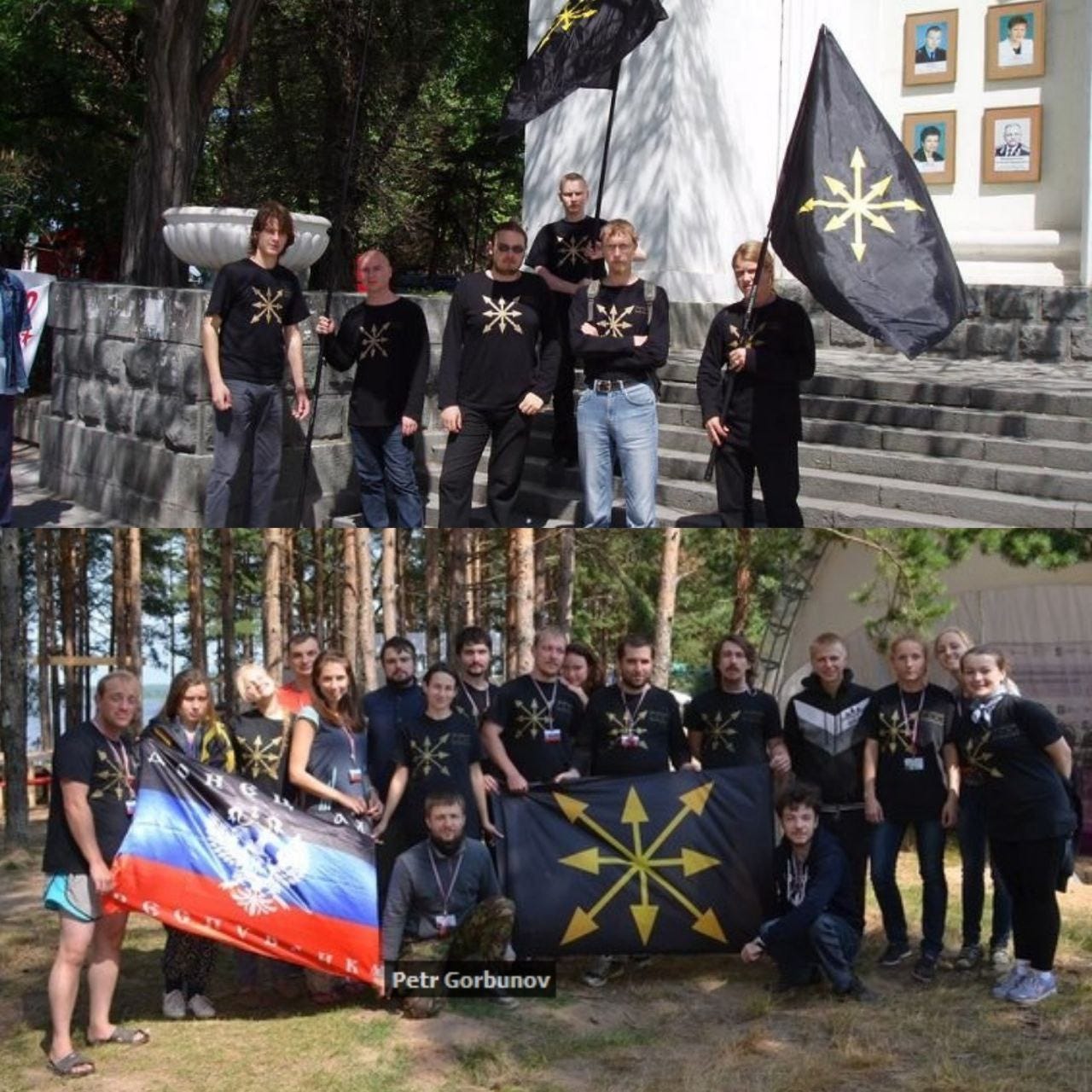
When it comes to determining which ideologies could take off in Russia, I am a geographical determinist. It is a country with a moderately bad climate, with huge barren frozen spaces, a sole coveted warm spot adjacent to the Black Sea, a few troubled mountainous regions, and a swampy heartland. The spirit of entrepreneurship, which we associate with American pioneer settlers who conquered what is now known as a flyover country, will never take hold in the harsh realities of Siberia. Optimistic people appear occasionally, only to be sobered up by the fact that their limbs are frozen. Cold climate breeds fatalistic stoicism, which in turn produces authoritarian modes of governance. This is why the most democratic thing you can possibly get in Russia, in my humble assessment, is the choice between authoritarians. Why would anyone want that choice and how long will it last is another question.
I always found the liberal and libertarian solutions to be unhelpful and harmful to the sole realistic task that could be undertaken in Russia - making it a sane moderate autocracy, that respects its neighbors, allows its citizens to visit ideological and geopolitical competitors, fights the xenophobes while respecting own culture. Simple in theory, hard in practice. For some, the desire to have European systems of electoral democracy overrides their basic respect for native culture. Such people gather in self-affirming marginal circles and foster unhealthy attitudes, which unite the xenophobic majority in resolve to crush the different.
In this light, I always saw Dugin as a realistic and hardworking fellow, able to work with whatever exists and add his own fetishes in the process. Unfortunately, his preferred form of force projection was always destined to bring the conflict with the West. As a child of Perestroika, I always wanted the continuation of Gorbachevist convergence and eventual unification of Europe, Ukraine, and Russia in a single geopolitical alliance. Yet I also shared Dugin’s feelings regarding the Brussels elites and their hirelings in post-Soviet space. Had he spent his time working on ways to replace liberals with nazbols across Western Europe and continue the convergence in this manner, I would be long naming myself a nazbol. It does appear though that in his case, the choice of ideas and actions is always secondary to the desire to self-segregate in a closed Eurasian environment, where he would be free to build a neo-Byzantian original culture.
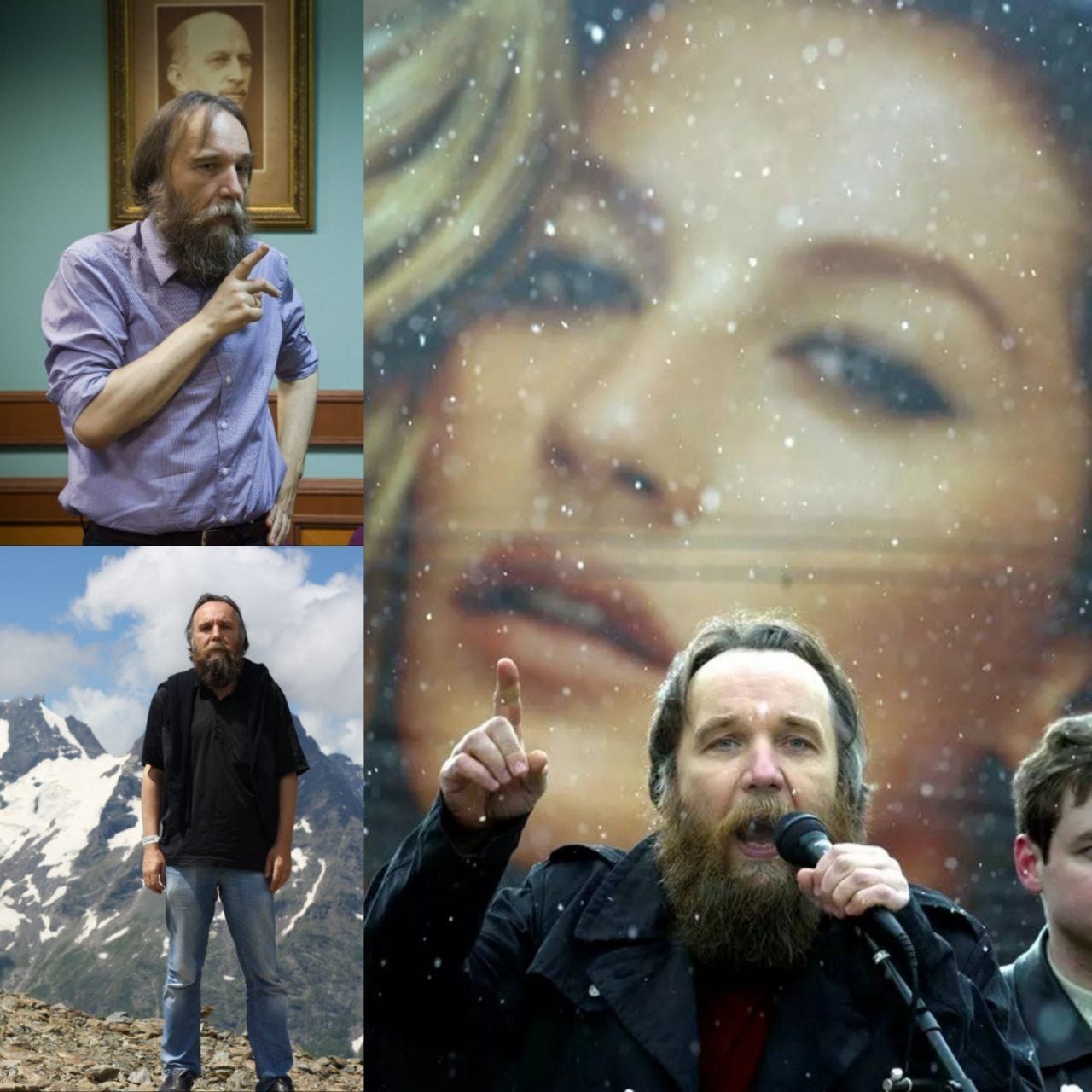
Post-Soviet radical right and radical left activists shared one common trait with each other, which differentiated them from the majority of liberal activists. They had an obsession over some abstract idea and used situations and people around them to get closer to that idea. Liberals sought an explanation, education, and an entrance to the system. A job. They might have different professions, but mentally all modern liberals in our region are employed by Timothy Snyder. Anyone willing to be an independent influencer had to find his own arguments against Francis Fukuyama, George Soros, and now Snyder. In Ukraine, the most charismatic and successful out of them was Dmytro Korchynsky, who deserves a separate article. He fought alongside Russian interests in Moldova and against them in Georgia, worked with Dugin and Limonov, and even read lectures for Putinist youth at Lake Seliger camp. Limonov never ceased to call him a noble man, even after he failed to lure Dmytro to the anti-Maidan side in 2014. Foreigners often get the impression that Korchynsky controls all independent activists in the country, but that is an overstatement. It’s just that those who don’t want to find themselves employed by Snyder often ask the advice of a man who spent decades resisting these forces.
The problem with independence that is it is subservient to power. It is possible to support someone's ascendance to the throne, but it is impossible to make everyone remember why you did it. Everyone attaches their own preferences, both positive and negative, to the man in power and assumes that most other supporters are largely similar. Obviously, in a better timeline, Korchynsky, Arestovych, and Ukrainian conservatives would be responsible for diplomacy with Russia. It is already irrelevant why Arestovych supported Zelensky, it is important that he is unlikely to play a serious role in any possible ending to this drama. In his Telegram channel, Dugin has already stated that Ukraine no longer exists, at the very least when it comes to Kharkiv. This means that all the territories that were supposed to constitute “Novorossiya” and were successfully captured by Russia will be treated as a regular Russian region. Like Russian SFSR in the USSR or the ethnically Russian heartland in the Russian Federation. Not like Ukraine in the USSR or Dagestan in the Russian Federation. If this happens, then Ukrainians, Malorussians, or Southern Russians, whatever name they might choose for themselves in these new circumstances, will not be able to create a privileged ethnic enclave within Russia like Chechnya did. They will be as poor and powerless as people in Kostroma, only with stronger FSB attention. From managerial perspective, achieving this goal requires relocation of personnel from Central Russia, entrusting them the local state apparatus and hoping that they won't get Ukrainized very quickly. These events already happen in Mariupol. A brave bet, rivaling the harshest Czarist measures. I don't believe in the success of any possible neo-Banderite guerrillas, which might indeed appear. After all, the USSR successfully crushed the original Banderites, and Russian crowd control techniques have improved significantly since then. But I do believe this might lead to immense chaos surrounding governance, economy, and personal relations, which could result in a complete collapse of an entire region.
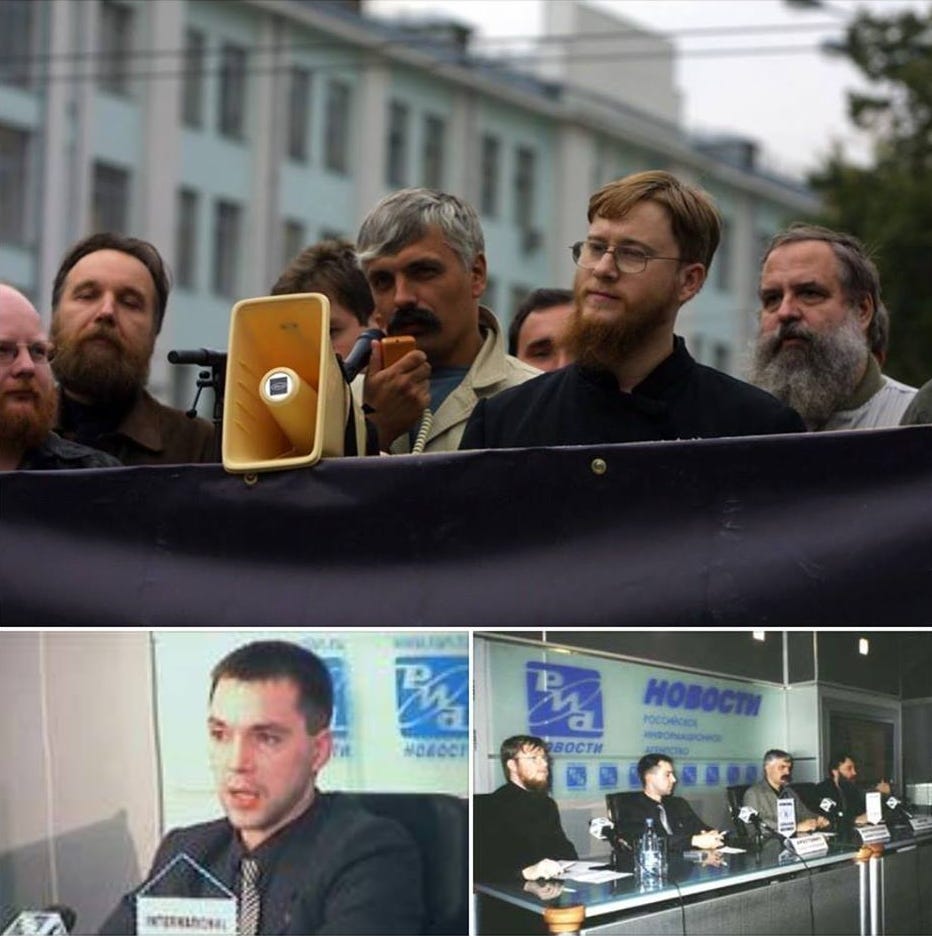
The ontological front is very important in post-war settlement. How all this gets named after the dust settles will set the riddles for upcoming generations to solve. Provided I survive until the end of the war, I plan to take part in naming. Of course, state strategists will have their own plans, as they do now, but in some situations it is difficult to ignore opinionated marginals. Therefore, I wish to clarify in which ways I differ from the principles set by Dugin in his most important work “The Fourth Political Theory”. Aleksandr tries to present his strategy on transcending the limits, put on us by the leftovers of three half-dead ideologies of Modern: liberalism, fascism, and communism. I do share the view that this needs to be done, if only because all these three terms have already become zombified unnatural hybrids. But even if we forget that geopolitical determinism often trumps ideological positions in his case (Dugin likes Brazilian President Lula despite SJW elements in his domestic politics and never criticizes Iran for being the regional center for transsexual surgeries), his proposed recipe is not a pure National Bolshevism of Niekisch variety, not a complete rebuke of Western liberalism, and not a complete break with Soviet legacy. Rather, it is a cocktail, consisting of about 70% fascism, 20% liberalism and 10% communism.
Book’s comparative diagram has 18 subjects where he says which exact things he wants to take from each ideology. Most of the solutions are just renamed, romanticized, or updated fascist solutions. There are only four exceptions:
Economy. He proposes to abolish private property by seizing the bourgeois means of production. Instead of introducing war communism, New Economic Policy, or state capitalist system like a Soviet man would do, he wants to give it all away to “spiritual aristocracy”.
On the national question, he breaks with all three ideologies by saying that nations should be destroyed as unnecessary bourgeois inventions and nationalism should be forbidden. This would’ve been close to the position of anti-internationalist left communists (Rosa Luxembourg, Amadeo Bordiga), had he any plans for world communism as they did. Likely it is a continuation of a specifically Russian form of multiculturalism, the Orthodox one. In this sense, he is close to Patriarch Kirill, who also continuously condemns all forms of nationalism, including Russian nationalism. This closeness does not help Dugin become favored among the Orthodox hardliners and Patriarch-adjacent crowd. These people cannot forgive him for his forays into paganism, satanism, and the occult forms of spirituality.
Regarding women, he proposes “transcendent gender, spiritualist feminism, and heroic virilization”. I can only imagine it as a combination of gym bros and desexualized post-women many Jungerophile congregations already boast. On this question, he came into conflict with many anti-woke Westerners. Also, this is probably the only question where I am to the right of him, being the gender essentialist. Hard to say whether his murdered daughter was fully in tune with this vision. She wasn’t a perfect Chekhov girl, a common Russian archetype of moderately conservative women. This girl is. Dugina wasn’t wearing pants on principle either. She was very unclear on everything, except her desire to conquer Ukraine.
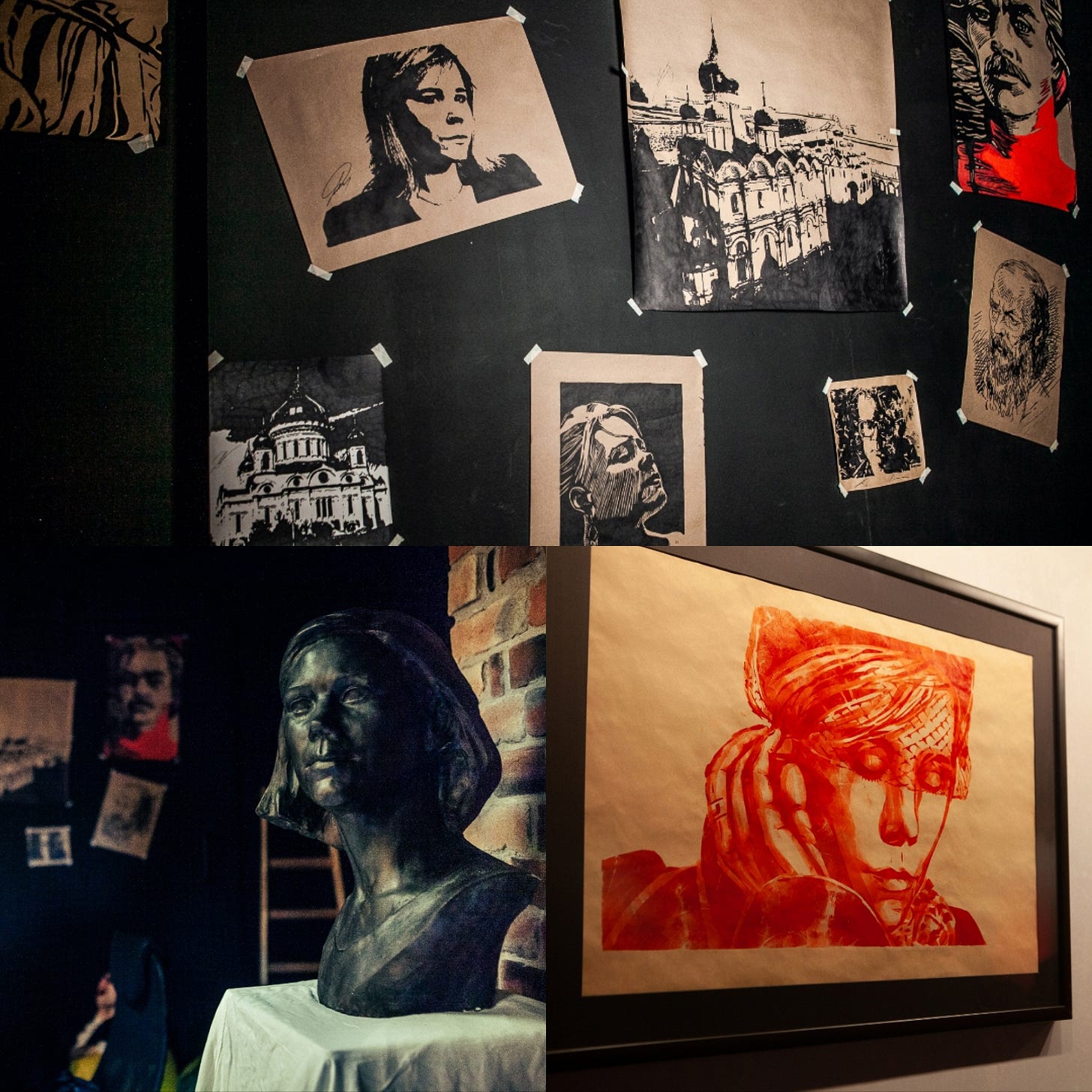
Darya Dugina’s posthumous cult of personality is already far ahead of whatever is done for Navalny by his disorganized supporters. I definitely see an influence of Islamophile rightist Rene Guenon in the style of this presentation. And, perhaps, modern Shiite Islam as well. The book’s subject №16 is short but revealing. On rationality, he correctly attributes “dry” mathematical rationality to liberalism, class-conscious materialist rationality to communism, and irrationality to fascism. Regarding what the fourth political theory should stand for, his answer is hyper-rationality. The most liberal of his positions, which partially explains the aforementioned Lula-Iran issues.
To summarize. Dugin wants to resurrect several pre-modern quirks using fairly modernist methods. Many of the things he deems acceptable wouldn’t be acceptable in a properly traditionalist or neo-fascist society. Just like Limonov, he is a boomer in more ways than apparent at first sight, shaped by the goods and evils of the Soviet system first, Western efficiency second, and what he understands as realism in state management third. Obviously, his economy won’t solve the old Marxist Entfremdung issue, which was always of great importance to me. On the national question, the nation that refuses to be called the nation still remains one, regardless of how righteous or spiritual its citizens are. On women, my ideal world is the one where Alex Undersky successfully marries Ksenia Burda. I am definitely a radical communist on rationality. And regarding the rest of his neo-fascist points, from reading his book I never understood why should I choose to follow the fourth political theory instead of pure modernist fascism or hardline religious traditionalism, even in case those points started to bother me. This begets a question - isn’t the whole discourse only fascist enough to have a public debate with liberal prima donna Bernard-Henri Levy? Would a proper fascist get to talk with Levy? Guess the answer is very much dependent on whether you consider ruscism a sound scientific theory with historical implications or just an Internet meme, astroturfed by NAFO.
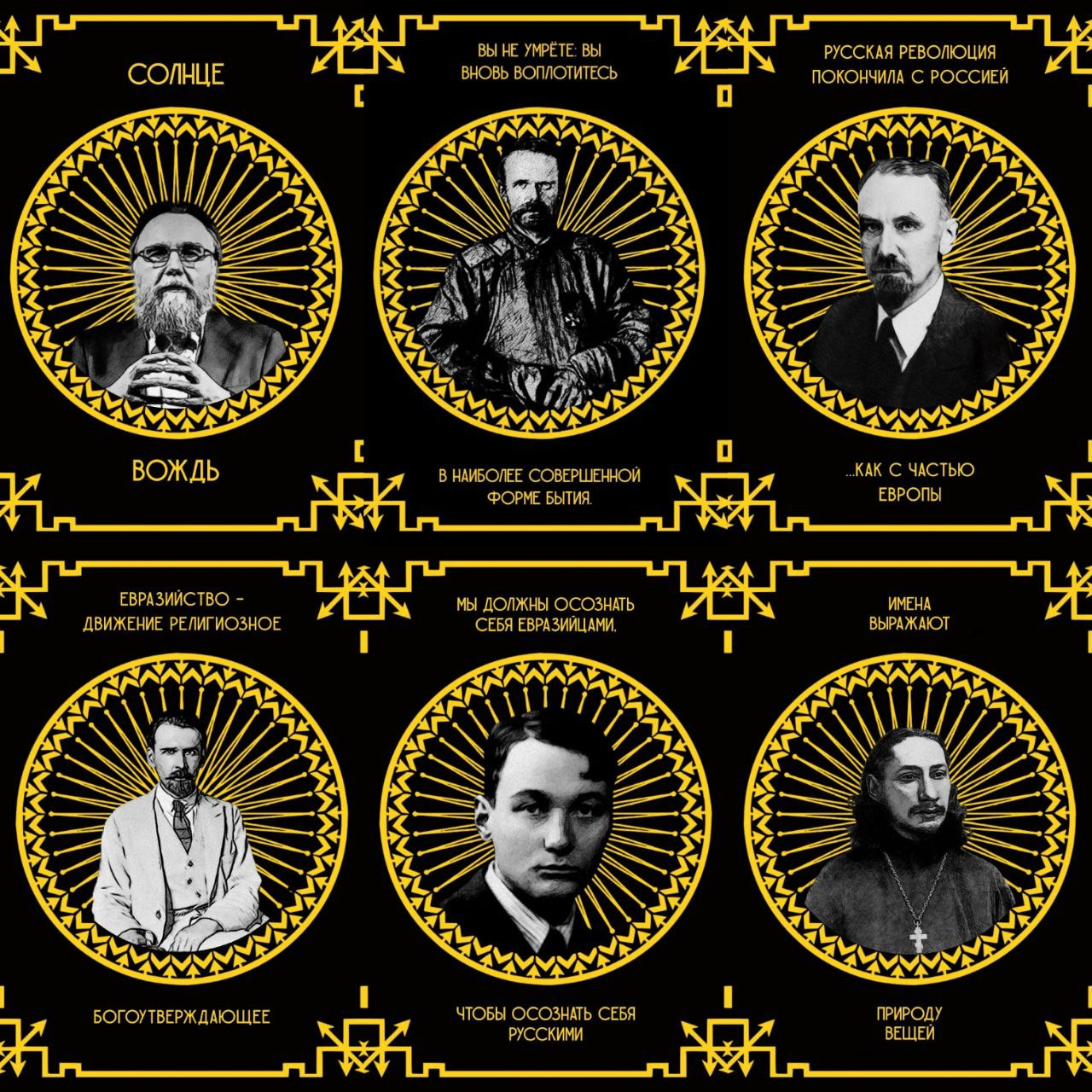
Limonov, Dugin, Korchynsky, and Arestovych are united in eclectic attempts to think using their own heads instead of higher-ups in the American State Department. Sadly, the first two shared the mainstream Russian belief that the best Russian borders end near Poland. Intelligence services supported all four, and as such they represent not only themselves but the collective consensus of influential strata in Moscow and Kyiv. I alone was trying to rewrite the consensus from below and all I ever got from security services was an offer to support their decision-makers, to trust their plan.
As the united casualty toll of ongoing war nears one million, both systemic and edgy thinkers in Russia and Ukraine have capitulated before the repressive apparatuses of their countries. Whoever leaves last - turn off the lights.
Coming up next:
Soviet Identity. People who self-identified as neither Russian nor Ukrainian but Soviet - myth or reality?
Dmytro Korchynsky. Just how pro- or anti-Russian the guy truly is and is it fair to call him far-right?
One movie analysis and one celebrity retrospective.
This blog will never have paywalled texts. If you liked this article, consider donating willingly, using this safe official link - https://send.monobank.ua/93ZYVV68fz

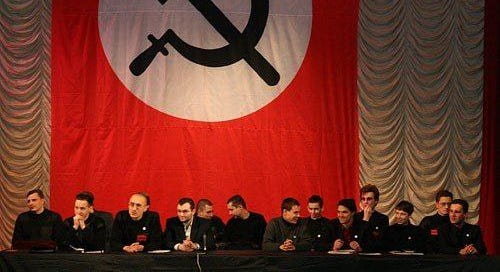


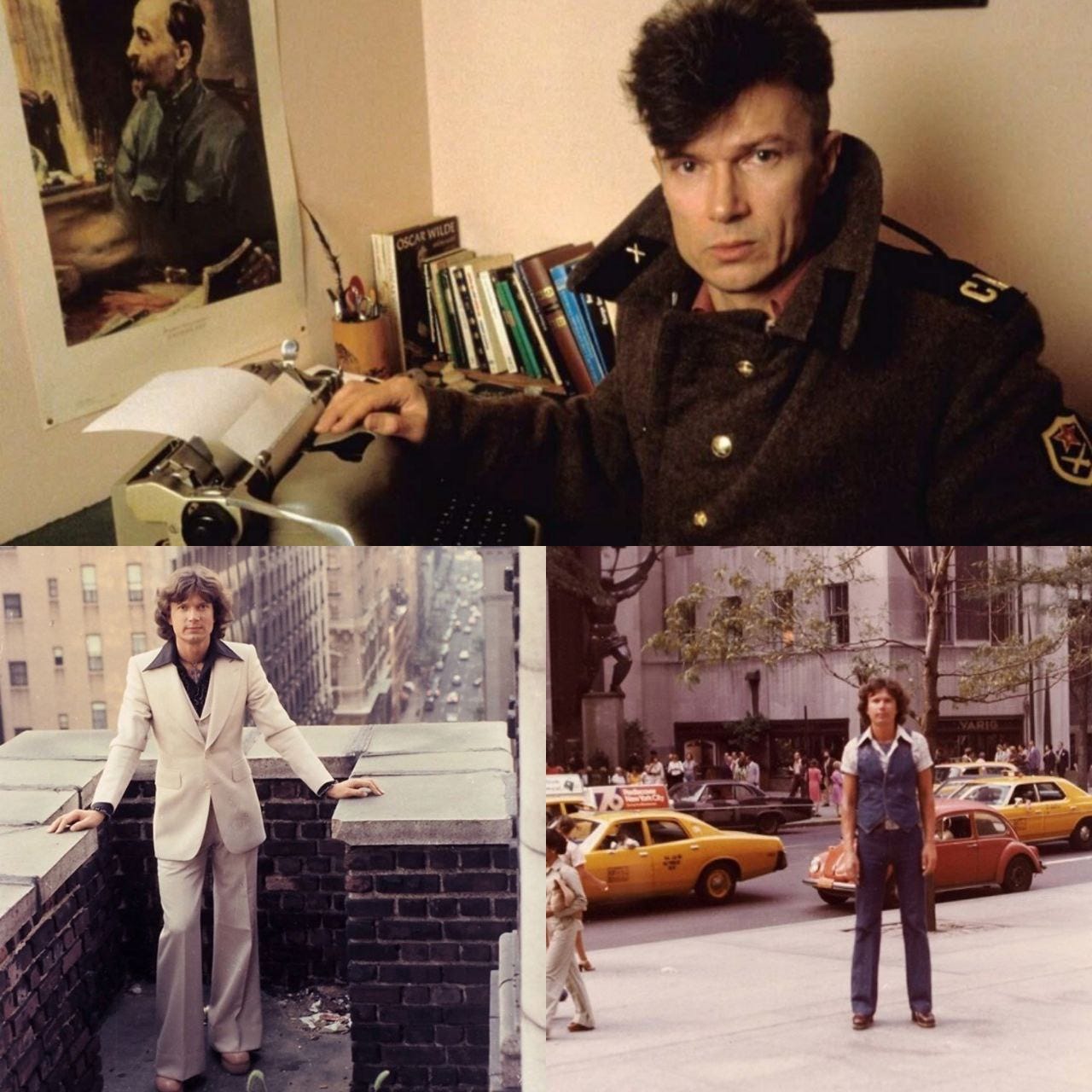
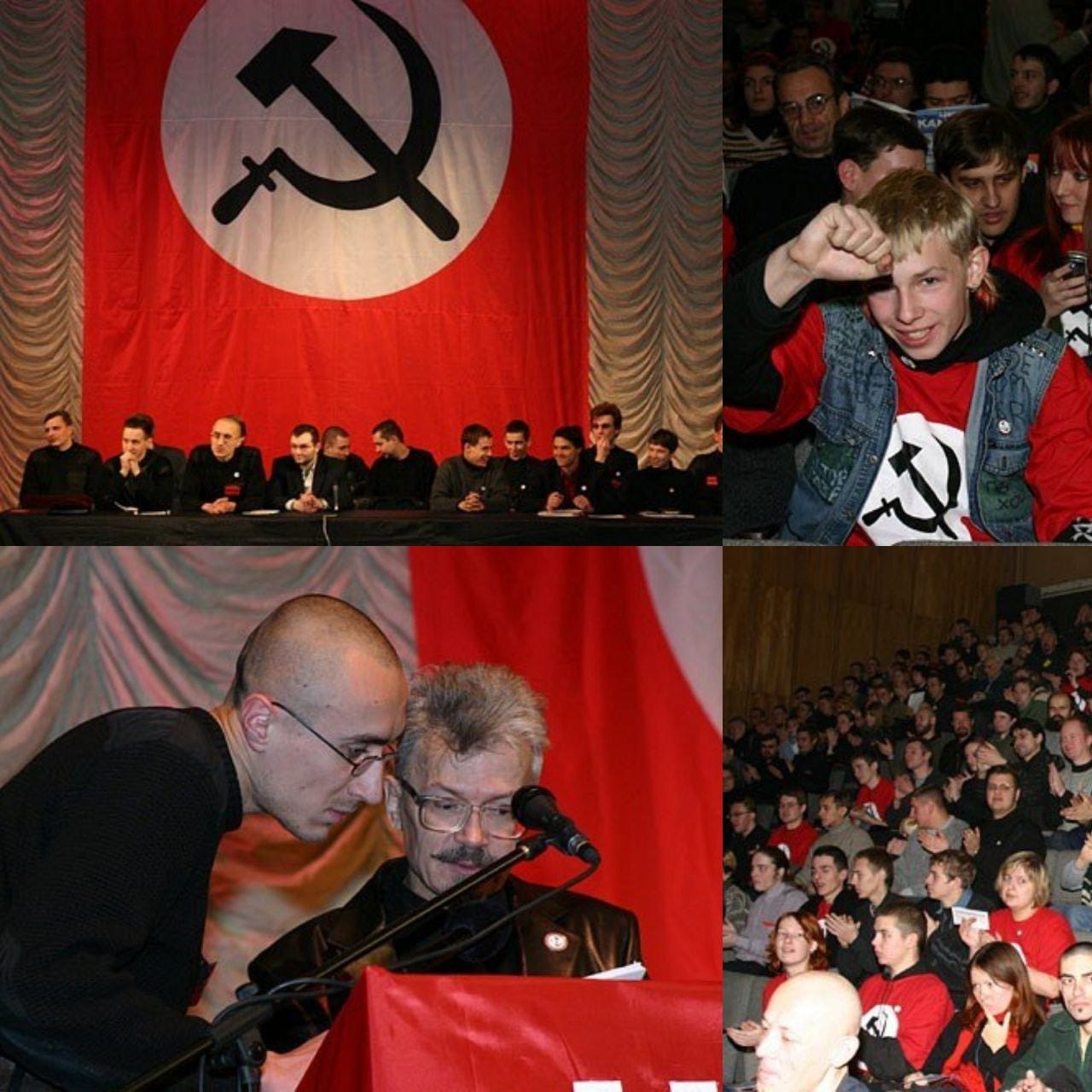
A geographical determinist? But Russia's history had Novgorod Republic and Mangazeya!